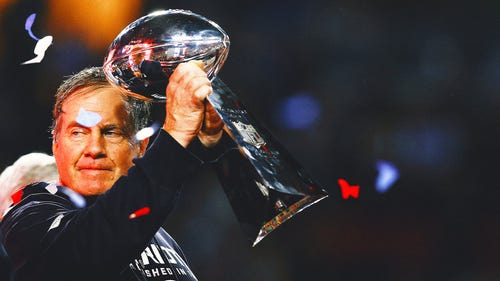
Mike Pereira's Oct. 26 mailbag
Hi everyone, here are a few more Mailbag questions this week and I’m happy to answer them. (Read the latest chat recap here).
Roger W. from Silt, Colo., wrote:
"Why in the Green Bay/Minnesota game Sunday night when Clay Matthews was rushing he was blocked by two people as he was rushing Brett Favre and he took off his helmet. Why wasn't this an unsportsmanlike penalty? Please answer this question."
Interesting play Roger. The helmet started coming off as he was being blocked. He then pushed it the rest of the way off because it appeared to block his vision. The interesting part is that it is not a foul. The rule book is specific when it states, it is sportsmanlike conduct for "removal of his helmet by a player during a celebration or during a confrontation with a game official or another player." What happened in the Green Bay game was not unsportsmanlike conduct but it was stupid in my opinion. Maybe this is Matthews' solution for not getting called for a helmet-to-helmet hit on a defenseless player.
M. from Superior, Wisc., wrote:
Mike, Please talk about the call with Visanthe Shiancoe’s TD that got called back in the Vikings-Packers game. Pretty happy with the call as a GB fan, but did they get it right?
No, they didn't. The ruling on the field was touchdown. In order to overturn that to incomplete, there has to be indisputable visual evidence that he lost control of the before or after the ball hit the ground. You could make a case that the ball might have been moving a bit on his way to the ground but he still had both hands on it and has it secure enough to deem control. The ball moving is not considered loss of control. It is a judgment call but this was not enough to reverse the call that was made on the field.
Tom C. from Mundelein, Ill., wrote:
If it is legal for teammates to push the runner forward in the field of play, exactly what is considered to be "aiding the runner" and a rules infraction?
Hi Tom. Aiding the runner is only a foul if you lift a runner from the ground or you pull him forward. Pushing him forward is no longer a foul. This was changed several years ago when it was determined that pushing a runner always occurred when there was a pile of players and it was impossible to determine whether the runner or the pile was getting pushed forward. Remember the Notre Dame/USC game a few years back when Matt Leinart was pushed into the end zone? Not a foul in the NFL.
Bob B. Falmouth, Maine wrote:
Looking at the New England/San Diego game, the Chargers' Richard Goodman said that he should have just handed the ball to the official rather than leave it on the ground. What should an official do if a player attempts to hand them a live ball — other than run like hell to avoid being tackled by the opposing team along with the ball-carrying player?
Hey, Bob. You run to the nearest Port-A-Potty and lock the door. Seriously, there is a rule to cover this. If a loose ball touches a game official, the ball remains live and can be possessed by either team. If a loose ball is possessed by the game official, the ball is automatically dead and belongs to the team that was last in possession. I guarantee you one thing — you will hear a quick whistle if this happens.
Bob G. from Pittsburgh wrote:
After the call, there was a great deal of discussion about “scrum.” Can you explain what that means and how it applies to the ruling?
I am really not sure where the term comes from but it is probably from the game of rugby where a big group of players is trying to get possession of the ball. Better terminology for our game is probably a pile. It applies to the play in Miami because in order to give the ball to Miami, you would need to have clear video evidence that a Miami player had total control of the ball before he disappeared into the pile (scrum). That was not the case.
What happens coming out of the pile is irrelevant. By the way, don't look for the rule to change. The rules committee was hesitant to change the rule anyway since essentially the ball is dead when the touchdown ruling is made. They will not extend to review beyond an immediate recovery before going into a pile.
Jerry M. from Durham, N.C. wrote:
Do you think there could be a conflict of interest allowing a Pittsburgh native to make the call on who wins the game against Miami?
No. This happens all around the league. They have referees that live in the San Francisco Bay Area and work Raiders and 49ers games.
How far outside of the Pittsburgh city limits would one have to live to avoid the conflict? The assigning restrictions that are in place are enough in my opinion. An official can't work a team more than twice, and never within a six-week period. In most cases they work a team only once. Officials’ decisions are not influenced by where the live or who the player is. Their decisions are influenced by their desire to remain an official in the league.










